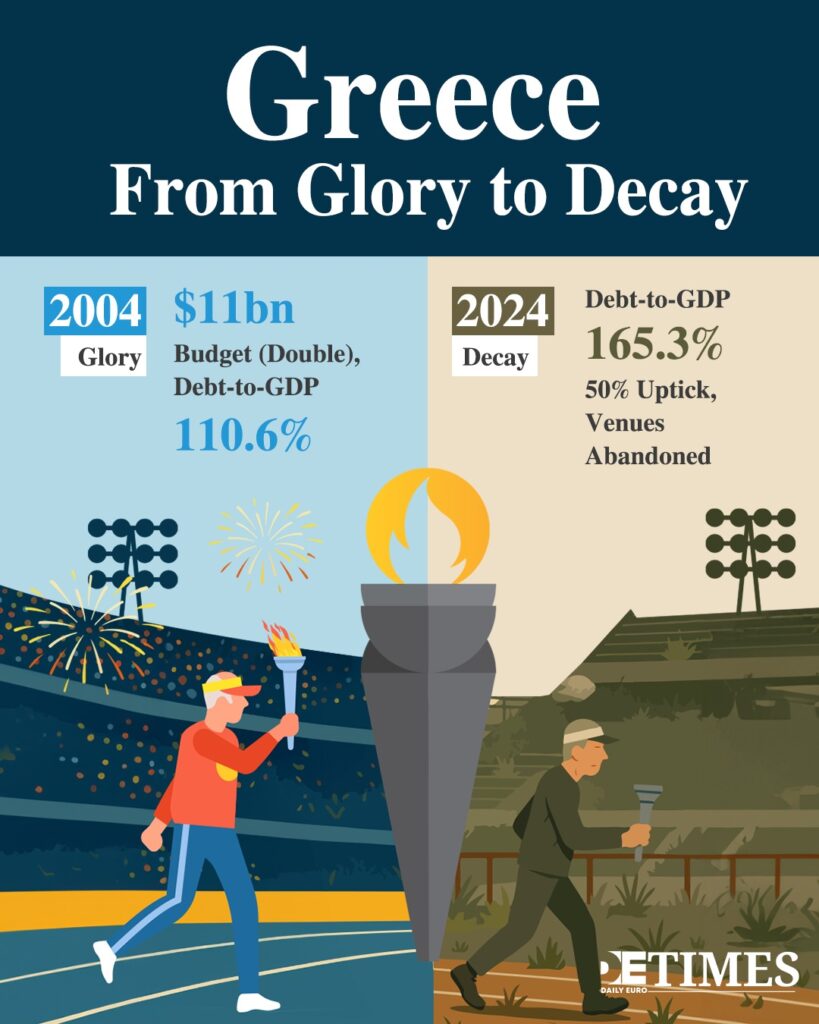Earlier this year, pictures of Greece’s abandoned Olympic venues spread like wildfire on social media. The Faliro Olympic Beach Volleyball Centre, snapped in February 2024, stands empty with crumbling bleachers.
Two decades after Athens welcomed the world, the stadium is a stark reminder of Greece’s long struggle to benefit from the Games that cost 8.5 billion euros.
Meanwhile, young Moroccans are clashing with police over spending for the 2030 World Cup. Brazilians still recall the protests against the 2014 tournament’s hefty price tag.
Greece’s story is making headlines again as new host nations repeat the same mistakes.
From Glory to Decay
Greece spent about 11 billion dollars on the 2004 Olympics — more than double the budget. That year, the country’s debt-to-GDP ratio hit an EU-high of 110.6 percent.
Today, over half of Athens’ Olympic venues sit unused or abandoned. The canoe and kayak course, table tennis and field hockey arenas all gather dust. Plans to turn the slalom course into a water park never came to life.
The baseball stadium at Hellinikon Olympic Complex has been left to rot since the Games ended. The weather beats down on empty bleachers, untouched by maintenance.
Once vibrant, the Olympic Park has grown quiet and birds chirp where cheers once echoed.
Even the main Olympic Stadium closed in October 2023 due to safety concerns. Greek officials shuttered the 70,000-seat venue amid fears over its steel dome’s stability. It reopened in May 2024 after repairs, but renovations will continue into 2026.

The Price of Prestige
The 2004 Olympics became a symbol of Greek economic troubles. Budget misses, poor planning, and financial mismanagement created a perfect storm.
By 2005, the European Commission put Greece under fiscal watch. Four years later, the 2008 financial crisis hit hard.
Between 2008 and 2010, Greece’s economy stalled, and its ability to repay debts declined sharply.
The country endured a sovereign debt crisis marked by widespread poverty and loss. Sweeping reforms reshaped society for decades. As of today, Greece’s debt stands at 165.3 percent of GDP.
Many Greeks, and even the International Olympic Committee’s head, blamed the 2004 Olympics for triggering the debt crisis.
The link between overspending and economic collapse was clear. The deficit in 2004 exceeded twice the eurozone’s limit.
History’s Echo
Today, Greece’s empty stadiums stand as monuments to misplaced priorities. Venues sit overgrown and unused, with the government lacking funds to maintain what was built for just a few weeks.
Brazil followed the same path ten years later. The 2014 World Cup cost at least 14 billion dollars — three times what South Africa spent in 2010. Over a million Brazilians protested in June 2013.
They criticised the billions poured into stadiums while public services suffered. Former player turned parliamentarian Romário called it the "biggest theft in history." Meanwhile, metro and bus fares rose to cover costs.
Citizens saw the hike as a slap to working people. Protesters demanded more spending on health, education, and public transit. Four of the 12 new stadiums were expected to become costly white elephants.
The Latest Iteration
Now, Morocco’s youth raise similar voices. Hundreds of young people protested in at least 11 cities. They called out corruption and blasted government spending choices.
Billions are going toward new stadiums and renovations for the 2030 World Cup, while healthcare and education fall behind. Police in riot gear dispersed crowds and made arrests.
Protesters draw a clear line between poor healthcare and splurging on sports. Morocco is also set to host the Africa Cup of Nations later this year. Public funds flow into sports facilities while basic services crumble, protests decry.
The demonstrators mainly demand better public education and healthcare. One protester asked why vast money goes to the World Cup while hospitals struggle.
Bread Before Circuses
Across the Mediterranean, Greece’s Olympic venues rose from economic chaos. The 2004 Games cost twice what was planned, leading to public borrowing that pushed debt to unsustainable levels.
Greece was the first EU country put under fiscal watch. It still deals with the fallout two decades later. Videos now tour the decaying sites, capturing what remains.
Athens’ Olympic facilities stand as a stark reminder of Greece’s failure to make the most of its Olympic legacy.
The venues’ fate has been a cautionary tale for 20 years, with some, like the softball stadium, deemed useless since the sport isn’t widely played in Greece.
Keep up with Daily Euro Times for more updates!
Read also:
Nepal’s Authoritarian Backlash: A Lesson in Governance
Greece’s €1.6 Billion Bet: Can Money Solve the Demographic Crisis
Greece, Migration, and the Pause: A Temporary Solution or a New Course






